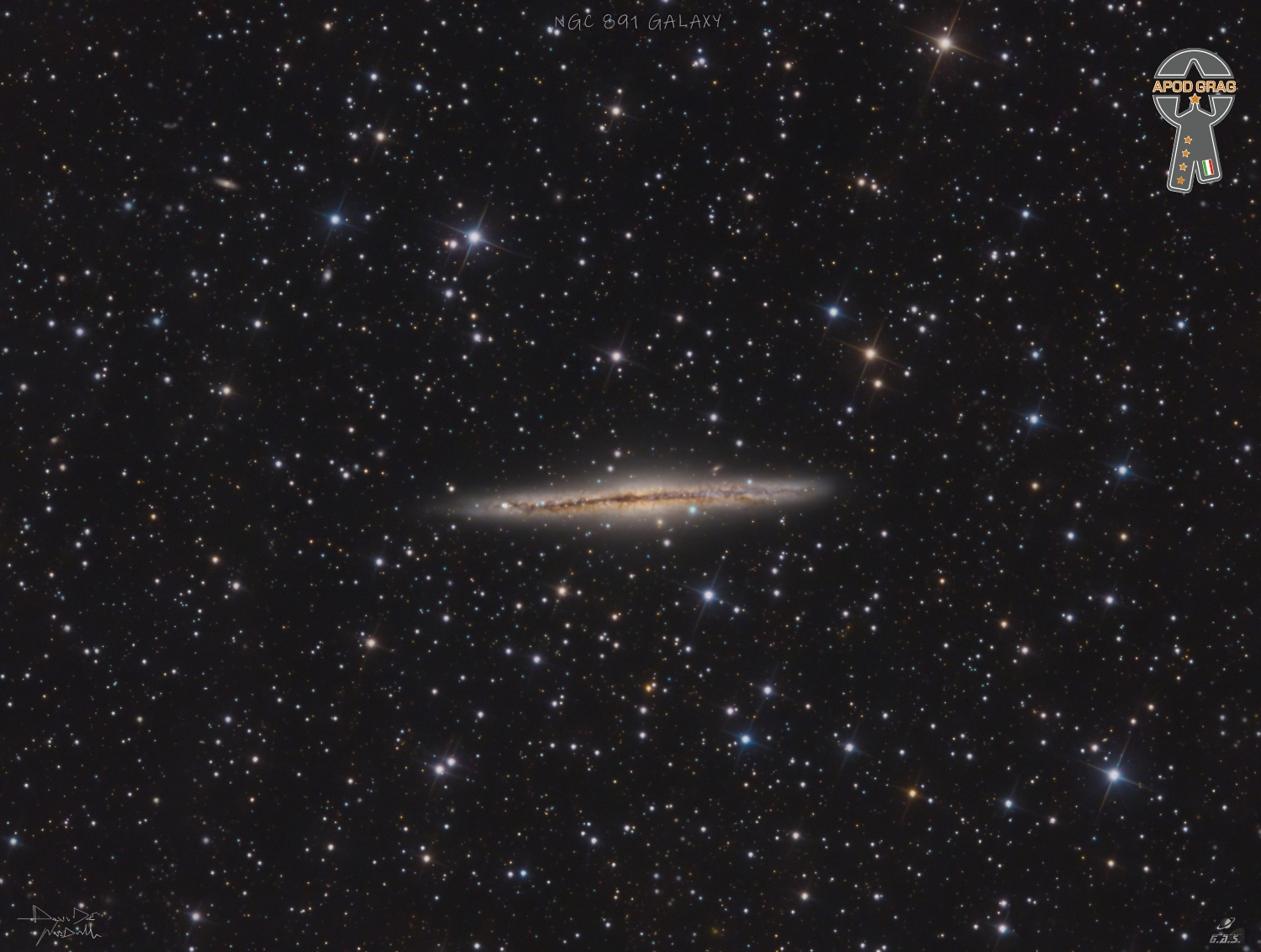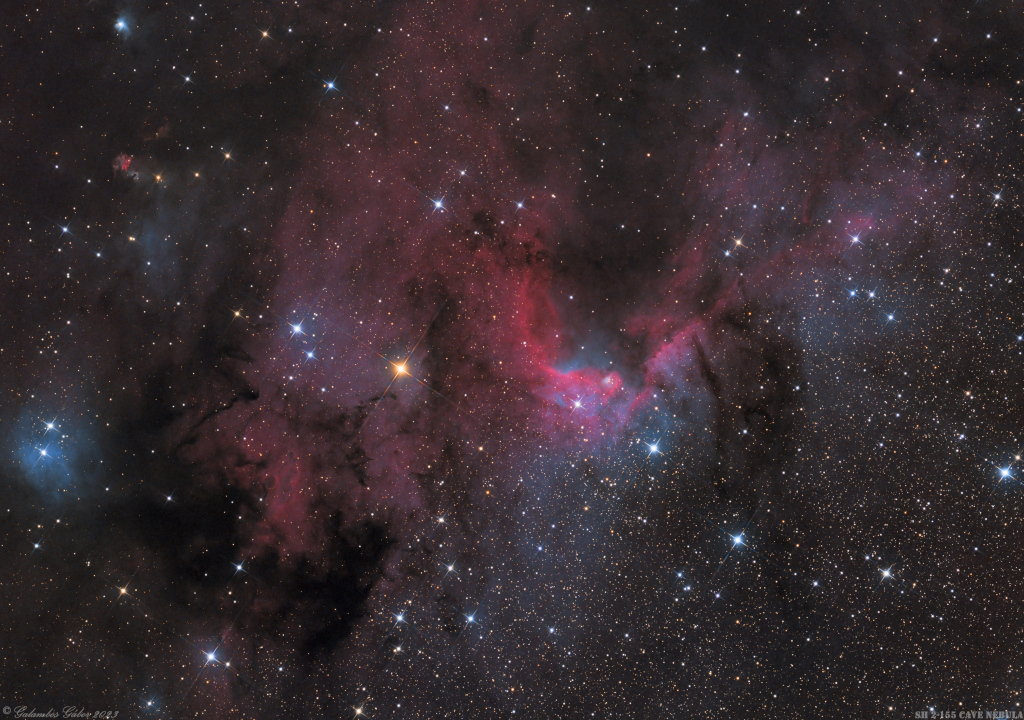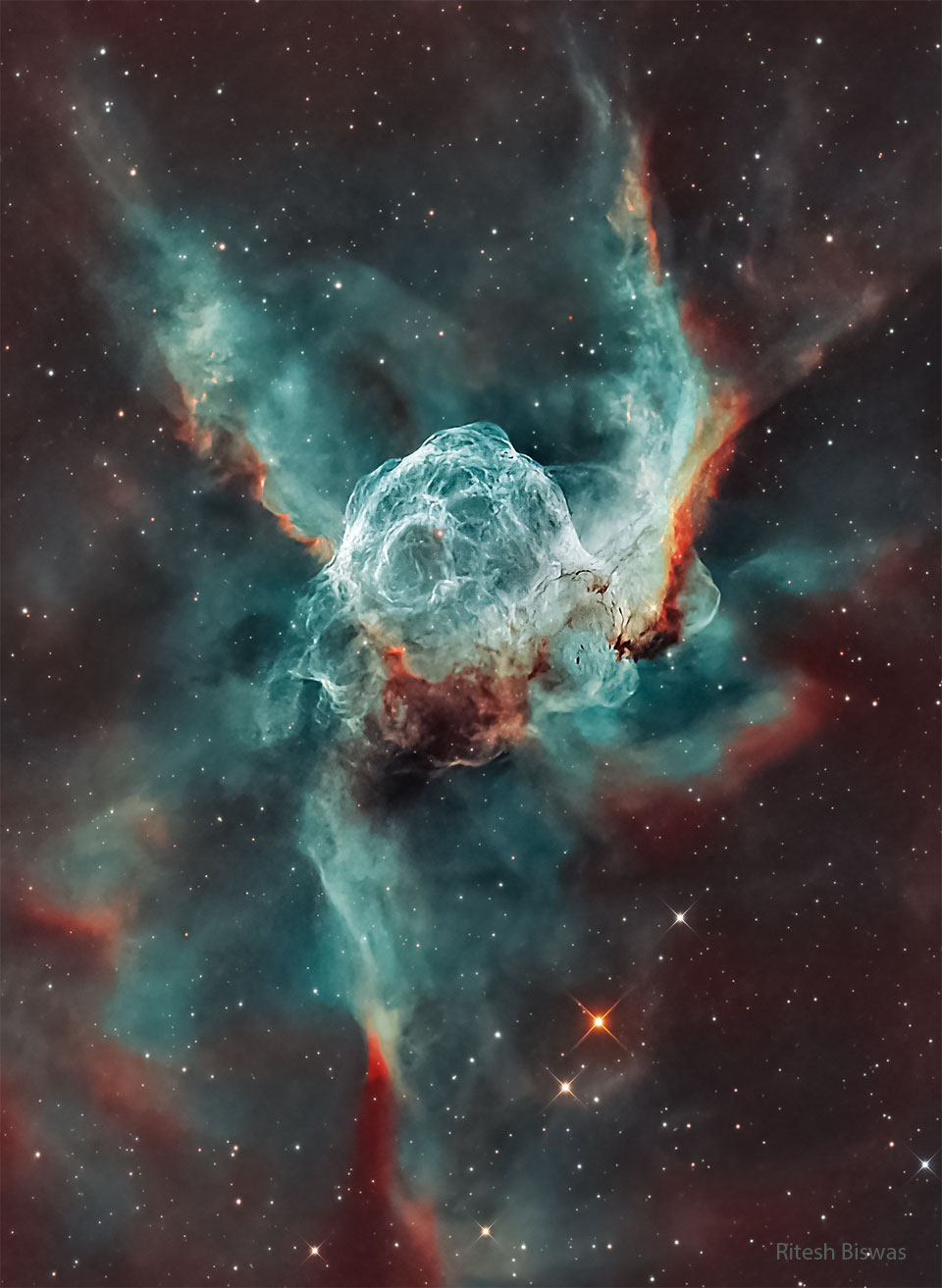Blog
NGC 891 (also known as Caldwell 23, the Silver Sliver Galaxy, and the Outer Limits Galaxy) is an edge-on unbarred spiral galaxy about 30 million light-years away in the constellation Andromeda. It was discovered by William Herschel on October 6, 1784. The galaxy is a member of the NGC 1023 groupof galaxies in the Local Supercluster. It has an H II nucleus.
The object is visible in small to moderate size telescopes as a faint elongated smear of light with a dust lane visible in larger apertures.

Lee Mack Ritenour (born January 11, 1952) is an American jazz guitarist who has been active since the late 1960s.
Ritenour was born on January 11, 1952, in Los Angeles, California, United States. At the age of eight he started playing guitar and four years later decided on a career in music. When he was 16 he played on his first recording session with the Mamas & the Papas. He developed a love for jazz and was influenced by guitarist Wes Montgomery. At the age of 17 he worked with Lena Horne and Tony Bennett. He studied classical guitar at the University of Southern California.
Ritenour’s solo career began with the album First Course (1976), a good example of the jazz-funk sound of the 1970s, followed by Captain Fingers, The Captain’s Journey (1978), and Feel the Night (1979).
more...Slim Harpo (born James Isaac Moore; January 11, 1924 – January 31, 1970) was an American bluesmusician, a leading exponent of the swamp blues style, and “one of the most commercially successful blues artists of his day”. He played guitar and was a master of the blues harmonica, known in blues circles as a “harp”. His most successful and influential recordings included “I’m a King Bee” (1957), “Rainin’ in My Heart” (1961), and “Baby Scratch My Back” (1966), which reached number one on Billboard‘s R&B chart and number 16 on its broader Hot 100 singles chart.
Moore was born in Lobdell, Louisiana, the eldest child in his family. After his parents died he worked as a longshoreman and construction worker in New Orleans in the late 1930s and early 1940s. Influenced in style by Jimmy Reed, he began performing in Baton Rouge bars using the name “Harmonica Slim”, and also accompanied his brother-in-law Lightnin’ Slim in live performances.
With his first scheduled tour of Europe and recording sessions already planned, “one of the cleanest living bluesmen of his era” died suddenly of a heart attack in Baton Rouge in January 1970 just 20 days after his 46th birthday. He was buried in Mulatto Bend Cemetery in Port Allen, Louisiana.
more...
This colorful skyscape spans about three full moons across nebula rich starfields along the plane of our Milky Way Galaxy toward the royal northern constellation Cepheus. Near the edge of the region’s massive molecular cloud some 2,400 light-years away, bright reddish emission region Sharpless (Sh)2-155 is at the center of the frame, also known as the Cave Nebula. About 10 light-years across the cosmic cave’s bright walls of gas are ionized by ultraviolet light from the hot young stars around it. Dusty bluish reflection nebulae, like vdB 155 at the left, and dense obscuring clouds of dust also abound on the interstellar canvas. Astronomical explorations have revealed otherdramatic signs of star formation, including the bright reddish fleck of Herbig-Haro (HH) 168. At the upper left in the frame, the Herbig-Haro object emission is generated by energetic jets from a newborn star.

James Joseph Croce (‘kroʊtʃi/) (January 10, 1943 – September 20, 1973) was an American folk and rock singer-songwriter. Between 1966 and 1973, he released five studio albums and numerous singles. During this period, Croce took a series of odd jobs to pay bills while he continued to write, record, and perform concerts. After Croce formed a partnership with songwriter and guitarist Maury Muehleisen in the early 1970s, his fortunes turned. Croce’s breakthrough came in 1972, his third album, You Don’t Mess Around with Jim, produced three charting singles, including “Time in a Bottle“, which reached No. 1 after Croce died. The follow-up album, Life and Times, included the song “Bad, Bad Leroy Brown“, which was the only No. 1 hit he had during his lifetime.
On September 20, 1973, at the height of his popularity and the day before the lead single to his fifth album I Got a Name was released, Croce and five others died in a plane crash. His music continued to chart throughout the 1970s following his death. Croce’s wife and early songwriting partner, Ingrid, continued to write and record after his death, and their son, A. J. Croce, became a singer-songwriter in the 1990s.
Croce was born on January 10, 1943, (although some sources say 1942) in South Philadelphia, Pennsylvania, to James Albert Croce (1914–1972) and Flora Mary (Babusci) Croce (1913–2000), Italian Americans whose parents had immigrated from Trasacco and Balsorano in Abruzzo and Palermo in Sicily. On the night of Thursday, September 20, 1973, during Croce’s Life and Times tour, which had been scheduled for 45 dates, and the day before his ABC single “I Got a Name” was released, Croce and five others were killed when their chartered Beechcraft E18S crashed into a tree during takeoff from the Natchitoches Regional Airport in Natchitoches, Louisiana. Croce was 30 years old.
more...
Mike Stern (born January 10, 1953) is an American jazz guitarist. After playing with Blood, Sweat & Tears, he worked with drummer Billy Cobham, then with trumpeter Miles Davis from 1981 to 1983 and again in 1985. He then began a solo career, releasing more than a dozen albums.
Stern was named Best Jazz Guitarist of 1993 by Guitar Player magazine. At the Festival International de Jazz de Montréal in June 2007, he was given the Miles Davis Award, which was created to recognize internationally acclaimed jazz artists whose work has contributed significantly to the renewal of the genre. In 2009 Stern was listed on Down Beat‘s list of 75 best jazz guitarists of all time. He received Guitar Playermagazine’s Certified Legend Award on January 21, 2012.
Stern was born Michael Sedgwick in Boston, Massachusetts, the son of Helen Stern (née Helen Phillips Burroughs), a sculptor and art patron, and Henry Dwight Sedgwick V. His adoptive stepfather was Philip M. Stern, the son of businessman Edgar B. Stern Sr. His half-sister is actress Kyra Sedgwick. Stern is married to guitarist and vocalist Leni Stern.
more...Maxwell Lemuel Roach (January 8/10, 1924 – August 16, 2007) was an American jazz drummer and composer. A pioneer of bebop, he worked in many other styles of music, and is generally considered one of the most important drummers in history. He worked with many famous jazz musicians, including Clifford Brown, Coleman Hawkins, Dizzy Gillespie, Charlie Parker, Miles Davis, Duke Ellington, Thelonious Monk, Abbey Lincoln, Dinah Washington, Charles Mingus, Billy Eckstine, Stan Getz, Sonny Rollins, Eric Dolphy, and Booker Little. He also played with his daughter Maxine Roach, Grammy nominated Violist. He was inducted into the DownBeat Hall of Fame in 1980 and the Modern Drummer Hall of Fame in 1992.
In the mid-1950s, Roach co-led a pioneering quintet along with trumpeter Clifford Brown. In 1970, he founded the percussion ensemble M’Boom. He made numerous musical statements relating to the civil rights movement.Early life and career
Max Roach was born to Alphonse and Cressie Roach in the Township of Newland, Pasquotank County, North Carolina, which borders the southern edge of the Great Dismal Swamp.
more...Thor’s Helmet, NGC 2359 is a hat-shaped cosmic cloud with wing-like appendages. Heroically sized even for a Norse god, Thor’s Helmet is about 30 light-years across. In fact, the cosmic head-covering is more like an interstellar bubble, blown with a fast wind from the bright, massive star near the bubble’s center. Known as a Wolf-Rayet star, the central star is an extremely hot giant thought to be in a brief, pre-supernova stage of evolution. NGC 2359 is located about 15,000 light-years away toward the constellation of the Great Overdog. This remarkably sharp image is a mixed cocktail of data from narrowband filters, capturing not only natural looking stars but details of the nebula’s filamentary structures. The star in the center of Thor’s Helmet is expected to explode in a spectacular supernova sometime within the next few thousand years.

James Patrick Page OBE (born 9 January 1944) is an English musician and producer who achieved international success as the guitarist and founder of the rock band Led Zeppelin. Prolific in creating guitar riffs, Page’s style involves various alternative guitar tunings and melodic solos, coupled with aggressive, distorted guitar tones. It is also characterized by his folk and eastern-influenced acoustic work. He is notable for occasionally playing his guitar with a cello bow to create a droning sound texture to the music.
Page began his career as a studio session musician in London and, by the mid-1960s, alongside Big Jim Sullivan, was one of the most sought-after session guitarists in Britain. He was a member of the Yardbirdsfrom 1966 to 1968. When the Yardbirds broke up, he founded Led Zeppelin, which was active from 1968 to 1980. Following the death of Led Zeppelin drummer John Bonham, he participated in a number of musical groups throughout the 1980s and 1990s, more specifically XYZ, the Firm, the Honeydrippers, Coverdale–Page, and Page and Plant. Since 2000, Page has participated in various guest performances with many artists, both live and in studio recordings, and participated in a one-off Led Zeppelin reunion in 2007 that was released as the 2012 concert film Celebration Day. Along with the Edge and Jack White, he participated in the 2008 documentary It Might Get Loud.
Page is widely considered to be one of the greatest and most influential guitarists of all time. Rolling Stone magazine has described Page as “the pontiff of power riffing” and ranked him number three in their 2015 list of the “100 Greatest Guitarists of All Time”, behind Jimi Hendrix and Eric Clapton, and ranking 3rd again in 2023 behind Chuck Berry and Jimi Hendrix. In 2010, he was ranked number two in Gibson‘s list of “Top 50 Guitarists of All Time” and, in 2007, number four on Classic Rock‘s “100 Wildest Guitar Heroes”. He was inducted into the Rock and Roll Hall of Fame twice: once as a member of the Yardbirds (1992) and once as a member of Led Zeppelin (1995).
more...
Joan Chandos Baez (born January 9, 1941) is an American singer, songwriter, musician, and activist. Her contemporary folk music often includes songs of protest and social justice. Baez has performed publicly for over 60 years, releasing more than 30 albums. Fluent in Spanish and English, she has also recorded songs in at least six other languages.
Baez is generally regarded as a folk singer, but her music has diversified since the counterculture era of the 1960s and encompasses genres such as folk rock, pop, country, and gospel music. She began her recording career in 1960 and achieved immediate success. Her first three albums, Joan Baez, Joan Baez, Vol. 2 and Joan Baez in Concert, all achieved gold record status. Although a songwriter herself, Baez generally interprets other composers’ work, having recorded songs by the Allman Brothers Band, the Beatles, Jackson Browne, Leonard Cohen, Woody Guthrie, Violeta Parra, the Rolling Stones, Pete Seeger, Paul Simon, Stevie Wonder, Bob Marley, and many others. She was one of the first major artists to record the songs of Bob Dylan in the early 1960s; Baez was already an internationally celebrated artist and did much to popularize his early songwriting efforts. Her tumultuous relationship with Dylan later became the subject of songs from both and generated much public speculation. On her later albums she has found success interpreting the work of more recent songwriters, including Ryan Adams, Josh Ritter, Steve Earle, Natalie Merchant, and Joe Henry.
Baez’s acclaimed songs include “Diamonds & Rust” and covers of Phil Ochs‘s “There but for Fortune” and The Band‘s “The Night They Drove Old Dixie Down“. She is also known for “Farewell, Angelina“, “Love Is Just a Four-Letter Word“, “Forever Young“, “Here’s to You“, “Joe Hill“, “Sweet Sir Galahad” and “We Shall Overcome“. Baez performed fourteen songs at the 1969 Woodstock Festival and has displayed a lifelong commitment to political and social activism in the fields of nonviolence, civil rights, human rights, and the environment. Baez was inducted into the Rock and Roll Hall of Fame on April 7, 2017.
Baez was born in the Staten Island borough of New York City on January 9, 1941.
more...Kenneth Clarke Spearman (January 9, 1914 – January 26, 1985), nicknamed Klook, was an American jazz drummer and bandleader. A major innovator of the bebop style of drumming, he pioneered the use of the ride cymbal to keep time rather than the hi-hat, along with the use of the bass drum for irregular accents (“dropping bombs“).
Born in Pittsburgh, Pennsylvania, he was orphaned at the age of about five and began playing the drums when he was eight or nine on the urging of a teacher at his orphanage. Turning professional in 1931 at the age of seventeen, he moved to New York City in 1935 when he began to establish his drumming style and reputation. As the house drummer at Minton’s Playhouse in the early 1940s, he participated in the after-hours jams that led to the birth of bebop. After military service in the US and Europe between 1943 and 1946, he returned to New York, but from 1948 to 1951 he was mostly based in Paris. He stayed in New York between 1951 and 1956, performing with the Modern Jazz Quartet and playing on early Miles Davisrecordings. He then moved permanently to Paris, where he performed and recorded with European and visiting American musicians and co-led the Kenny Clarke/Francy Boland Big Band between 1961 and 1972. He continued to perform and record until the month before he died of a heart attack in January 1985.
Clarke was born in Pittsburgh, Pennsylvania on January 9, 1914 as the youngest of two sons, to Martha Grace Scott, a pianist from Pittsburgh, and Charles Spearman, a trombonist from Waycross, Georgia. The family home was on Wylie Avenue in the Lower Hill District of Pittsburgh. Clarke’s father left the household to start a new family in Yakima, Washington, and his mother, who began a relationship with a Baptist preacher shortly afterwards, died suddenly in her late twenties when Clarke was about five, leaving him an orphan.
more...John Paul “Bucky” Pizzarelli (January 9, 1926 – April 1, 2020) was an American jazz guitarist.
He was the father of jazz guitarist John Pizzarelli and double bassist Martin Pizzarelli. He worked for NBCas a staffman for Dick Cavett (1971) and ABC with Bobby Rosengarden in (1952). Musicians he collaborated with include Benny Goodman, George Barnes, Les Paul, Stéphane Grappelli, Benny Green, and Antônio Carlos Jobim. Pizzarelli cited as influences Django Reinhardt, Freddie Green, and George Van Eps.
Pizzarelli was born on January 9, 1926, in Paterson, New Jersey, United States. He learned to play guitar and banjo at a young age. His uncles, Pete and Bobby Domenick, were professional musicians, and sometimes the extended family would gather at one of their homes with their guitars for jam sessions. Pizzarelli cited blind accordion player Joe Mooney as an inspiration. Mooney led a quartet that included Pizzarelli’s uncle, Bobby Domenick. During high school, Pizzarelli was the guitarist for a small band that performed classical music.
more...This Hubble Picture of the Week features Arp 122, a peculiar galaxy that in fact comprises two galaxies — NGC 6040, the tilted, warped spiral galaxy and LEDA 59642, the round, face-on spiral — that are in the midst of a collision. This dramatic cosmic encounter is located at the very safe distance of roughly 570 million light-years from Earth. Peeking in at the corner is the elliptical galaxy NGC 6041, a central member of the galaxy cluster that Arp 122 resides in, but otherwise not participating in this monster merger.
Galactic collisions and mergers are monumentally energetic and dramatic events, but they take place on a very slow timescale. For example, the Milky Way is on track to collide with its nearest galactic neighbour, the Andromeda Galaxy (M31), but these two galaxies have a good four billion years to go before they actually meet. The process of colliding and merging will not be a quick one either: it might take hundreds of millions of years to unfold. These collisions take so long because of the truly massive distances involved.
Galaxies are composed of stars and their solar systems, dust and gas. In galactic collisions, therefore, these constituent components may experience enormous changes in the gravitational forces acting on them. In time, this completely changes the structure of the two (or more) colliding galaxies, and sometimes ultimately results in a single, merged galaxy. That may well be what results from the collision pictured in this image. Galaxies that result from mergers are thought to have a regular or elliptical structure, as the merging process disrupts more complex structures (such as those observed in spiral galaxies). It would be fascinating to know what Arp 122 will look like once this collision is complete . . . but that will not happen for a long, long time.
[Image Description: Two spiral galaxies are merging together at the right side of the image. One is seen face-on and is circular in shape. The other seems to lie in front of the first one. This galaxy is seen as a disc tilted away from the viewer and it is partially warped. In the lower-left corner, cut off by the frame, a large elliptical galaxy appears as light radiating from a point. Various small galaxies cover the background.]

More Posts
- Stanley Jordan
- Kenny Burrell
- Hank Jones
- World Music The Ayoub Sisters
- Daily Roots Vivian Jackson & Horace Andy
- Cosmos IC 1396
- David Sanborn
- Jimmy Cliff
- Buddy Guy
- Vernel Fournier
- NO WAR STOP PUTIN DakhaBrakha
- Daily Roots Pat Rhoden
- Cosmos N132D
- Ellyn Rucker
- Vic Lewis
- Joe Beck
- Charlie Christian
- Flamenco Fridays Rafael Riqueni
- Daily Roots Gladstone Anderson
- Second Chance by Zamya Theater for the Homeless Community